| Reviews & Columns |
|
Reviews DVD TV on DVD Blu-ray 4K UHD International DVDs In Theaters Reviews by Studio Video Games Features Collector Series DVDs Easter Egg Database Interviews DVD Talk Radio Feature Articles Columns Anime Talk DVD Savant Horror DVDs The M.O.D. Squad Art House HD Talk Silent DVD
|
DVD Talk Forum |
|
|
| Resources |
|
DVD Price Search Customer Service #'s RCE Info Links |
|
Columns
|
|
|
Fringe: The Complete Fifth Season
Warner Bros. // Unrated // May 7, 2013
List Price: $39.98 [Buy now and save at Amazon]
The (Final) Season:
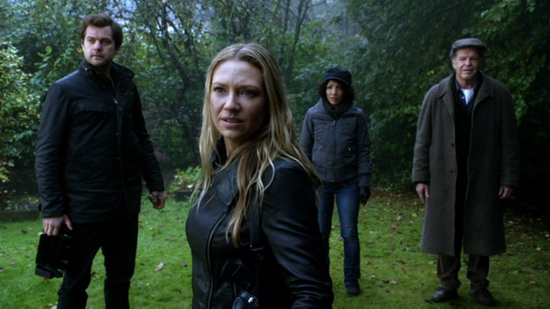
Being a fan of Fringe hasn't been an easy affair over the past few years: drops in ratings, time-slot shifts, budgetary concerns, and threats of cancellation as it sat on Fox's notorious chopping block loomed like a storm cloud over the highly-serialized sci-fi show. As the climate got rougher, however, those loyal to the Fringe Division -- or Fringe Divisions, plural, as the series moved along -- proved to be a formidable-enough collective to sustain it across four robust, inventive, and exhilarating seasons. For the series to have the opportunity to craft a thirteen-episode run of fan-service as a farewell,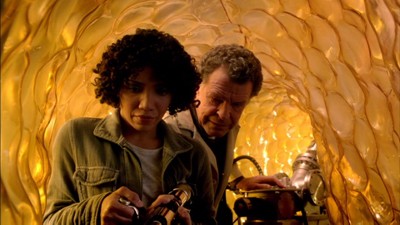 a pre-defined and planned conclusion to the overarching story, is actually something to celebrate. There's no denying that the final chapter sees its share of ups and downs, from convenient plans for superweapons to overly devil-may-care usage of pseudo-science to bolster the plot, but it does offer a cathartic and intense conclusion with emphasis on the show's crucial strength: the bond between its characters.
a pre-defined and planned conclusion to the overarching story, is actually something to celebrate. There's no denying that the final chapter sees its share of ups and downs, from convenient plans for superweapons to overly devil-may-care usage of pseudo-science to bolster the plot, but it does offer a cathartic and intense conclusion with emphasis on the show's crucial strength: the bond between its characters.
One way to figure out how someone's going to react to Fringe's final run will depend on how they feel about the previous season's (reviewed here) "Episode 19", the annual opportunity the show takes to break from the norm and try something abstract. Last year, that was "Letters of Transit", an episode that took what was assumed to be a glimpse into an unidentified Orwellian future in the year 2036, where the Observers have become fascist overlords and most of the Fringe Division's science/investigation team -- Peter (Joshua Jackson), Astrid (Jaskia Nicole), and Walter (John Noble) -- were carved out of self-inflicted amber and folded into the Resistance against them. The episode itself was successful: bleak, gritty, and sporting a clever (if obvious) twist at the end revealing a Resistance member and Fringe Division agent, Henrietta (Georgina Haig), to actually be the daughter of Peter and Olivia (Anna Torv). On its own, as a standalone "what if" scenario that could be looking into any of a number of realities, it works exceptionally well; however, showrunner J.H. Wyman and his crew adopted this as the basis for the half-season conclusion, in essence canonizing this "what if" situation into the real deal.
Not gonna lie: it's a little difficult to get into the rhythm of this once-speculative, upended dystopian future being where the show has finally arrived. The Fringe crew embark on a search for Olivia's location in a world where certain foods are used as currency and "amber gypsies" are actually a thing, while in the process of seeking out clues to build a vague blueprinted device for defeating the Observers -- which, as the story progresses, Walter conveniently loses the ability to remember. The case-by-case, quasi-scientific procedural structure of the show has been replaced with cutting through amber to find "tapes" that Walter once recorded about his plans in order to jar his memory, leading to obligatory fetch missions, while the dramatic backbone focuses on Peter and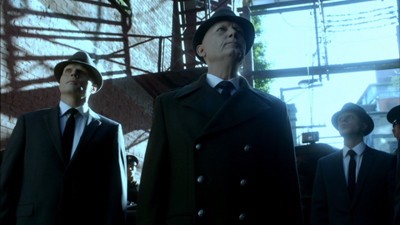 Olivia as they wrap their brain around this older, somewhat militant blond-haired woman being their once-lost daughter, Etta. Couple that with Walter's struggle with his state of mind, and it's an unusual situation in the dusty, amber-coated lab. Not that that's new or anything.
Olivia as they wrap their brain around this older, somewhat militant blond-haired woman being their once-lost daughter, Etta. Couple that with Walter's struggle with his state of mind, and it's an unusual situation in the dusty, amber-coated lab. Not that that's new or anything.
The jury's still out on how I feel about the Observers being the final "villain" that the Fringe team is working against, but at least it's a familiar entity that opens the door for opportunities to deepen the lore and explore lingering questions near the finish line. In essence, J.H. Wyman and his crew have guided the series down a conventional path by creating an overbearing, almost impenetrable threat with the "baldies" -- spearheaded by the particularly sinister Captain Windmark (Michael Kopsa) -- to give our beloved science team a force to combat in place of the shape-shifters. They reach deep into people's minds for answers, to a point where it could cause mental degradation and nosebleeds, and their teleportation ability allows them to pop in and out of locations so easily that they're able to sense danger and, more often than not, avoid being eliminated. The idea of most Observers as hyper-advanced, unshakable tyrants rarely feels creative, even when their morally gray motives are revealed; however, intriguing answers are presented about how September and the more benevolent ones fit into the equation, as well as how they maintain a grasp on "loyalist" humans. It's a trade-off, but not without disappointment.
With only vague remnants of the series' faux-scientific explorations appearing along the way as they discover answers and locate hardware, Fringe becomes all about building this superweapon that the science team simply doesn't understand, either how it works or what it'll do. It's a frustrating twist on the case-by-case procedural formula, a rhythm more similar to the bluntness of recent video-games instead of the series' clever grasp on unraveling mystery. Once you cut through the shift in time and the unbeatable threat they must defeat with the obscure weapon, you'll find some of the same quasi-scientific technobabble and discovery that makes the series an absorbing experience. The team investigates a collective of people who record events of humanity's history, who also seem to be experiencing an odd physical abnormality due to their location, while the presence of clairvoyants and pocket universes create obstacles for them to grasp while gathering components. There's something missing, though, and it's hinged on the show's shift from interactive curiosity to this bleak desperation.
experience. The team investigates a collective of people who record events of humanity's history, who also seem to be experiencing an odd physical abnormality due to their location, while the presence of clairvoyants and pocket universes create obstacles for them to grasp while gathering components. There's something missing, though, and it's hinged on the show's shift from interactive curiosity to this bleak desperation.
Fringe isn't afraid of exploring this darker side, and that's where its most powerful and unforgettable moments arise during this final stretch. Death occurs that will drive surviving characters towards unexpected methods of combating and standing against the Observers, making emotional envelope-pushing decisions that feel organic with their personality types. Walter ponders which element of himself defines him more: his flourishing intellect or his attachment to Peter, and whether losing one will affect the other. And Peter and Olivia embrace the necessity of what their daughter -- whom we first see as a happy girl blowing dandelions -- has been forced to become as a member of the resistance against those loyal to the Observers, namely her ruthless pragmatism and her inclination towards brutal tactics. The connection between family and friends has always been a, the, cornerstone of this science-fiction series, coupled with consistently outstanding performances; but instead of merely appreciating it this time around, it forces those watching to hold onto that for dear life as the future darkens and options grow fewer.
To counterbalance this, this season goes all-out to reward Fringe's followers with references and revisited plot elements, and in some clever ways that convincingly entwine with the forward-moving story. The writers obviously wanted to make long-running fans feel comfortable in this out-there future by recalling old cases, creating the illusion of widespread connections across the entire universe; one case from the very first season becomes exceedingly important. It's as if they were also marking off a checklist of things that would ensure grins from their fans, too: a return to the "red" universe, Olivia's uniqueness as a Cortexiphan patient, Walter in the isolation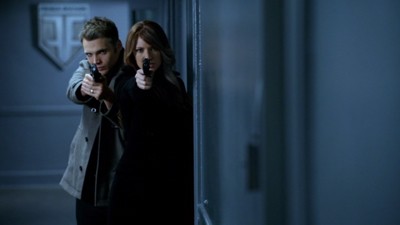 tank, and others. Fans will even get a charge out of seeing the mysterious glyphs, those emblems they've tracked and independently deciphered from the show's beginning, make an innocuous appearance during one episode. A lot of adoration went into crafting this engaging send-off, at times ignoring practicality simply to nod at those who get why certain things are cool. That even includes a ... uh, trippy "Episode 19" inspired by Monty Python and Moulin Rouge.
tank, and others. Fans will even get a charge out of seeing the mysterious glyphs, those emblems they've tracked and independently deciphered from the show's beginning, make an innocuous appearance during one episode. A lot of adoration went into crafting this engaging send-off, at times ignoring practicality simply to nod at those who get why certain things are cool. That even includes a ... uh, trippy "Episode 19" inspired by Monty Python and Moulin Rouge.
This servicing of the fans won't hide the fact that Fringe's final season suffers ups and downs, namely an erratic jumble of monumental, plot-solving devices that lean on the show's fondness for closing the book on complications with jargon and happenstance. Ultimately, though, once the climax comes around, those problem matters far less than how it nails the varied, bittersweet degrees of catharsis and redemption so desperately needed at the close of this story. It also doesn't shy away from answering certain hanging questions -- who the Observers are, what happened to September, how Walter can finally find peace within himself -- with involved connections to the narrative that round off the Fringe experience on a poignant and universe-enriching note, despite how one might feel about the answers themselves. "Brave New World" felt like it could've been a messy grand finale, if needed, but the one-two combo of "Liberty" and "An Ending of Fate" are really made of the stuff that banded the series' fans into a passionate crowd: an emotionally gratifying, interpretive, and reverent fringe event.
Check Out DVDTalk's Other Fringe Reviews:
Season One Blu-ray (DVD) | Season Two Blu-ray (DVD) | Season Three Blu-ray | Season Four Blu-ray
The DVD:
Fringe: The Complete Fifth and Final Season arrives from Warner Brothers in a standard four-disc case, with artwork atop each disc that features nondescript observers in different arrangements. Inside, an Episode Guide offers a brief synopsis of each episode alongside the air date and director for each, as well as annotating where the (few) special features can be found. A glossy cardboard slipbox replicates the front and back artwork.
Video and Audio:
Fringe fans pretty much know what to expect from these digital transfers: deep contrast that's often too deep, sharp details, and often vibrant colors. Warner Bros.' arrangement of 1.78:1-framed widescreen-enhanced episodes preserve the consistent look of the series, where most discs have three episodes of material (one has four). In general, the palette for this season leans towards darker, emptier elements out in the dystopian cities, where cold blues often dominate the image -- and are respectfully kept intact, while allowing bits of striking red to show up. Things get a little more colorful inside the lab and in other interiors, where the radiance and depth of amber and sketches on glass boards provide some vivid splashes of color. Tight close-ups are well-detailed, black levels hold their own as they occasionally swallow details, and skin tones carry the right punch.
Audio comes in 5-channel Dolby Digital tracks. Over the years, the Blu-ray treatments have finally moved over to Master Audio sound, but for several years the standard 5.1 offerings nailed the surround presence and aggressiveness of the series suitably enough. The same can be said for this arrangement of tracks: the dramatic score, the firing of quasi-futuristic firearms, and the strange sounds of technology frequently test the sound design to great effects. Dialogue is, surprisingly, a bit clearer than even some of the earlier Blu-rays, though still lacking in the high-end department. There aren't too many instances of aggressive bass to really pick out, save for gunshots and a few thuds, but the sounds of lasers cutting through amber and the frequency of signals tests the upper threshold well. In all, they're plenty satisfying. Portuguese language tracks are also available, as well as a slew of subtitle options: English, French, Chinese, Spanish, Portuguese, and Thai.
Special Features:
A Farewell to Fringe (21:04, 16x9):
Retrospectives often run the risk of being tiresome or a little to emotional for their own good, but I really like where this one goes. Cast and crew interviews from 2008 are paired with current interviews that reflect on their general experiences across the show, mixed with a few anecdotes. J.J. Abrams chats a bit about his initial inspiration behind what he wanted to do with the out-there science, while John Noble talks a bit about how he reacted to Lance Reddig when he first saw him. Also, J.H. Wyman reveals his perspective on how they landed on what questions to ultimately answer ... and which ones weren't as important. Finally, at the tail end, the retrospective focuses on the principal cast members' last days of shooting. Good stuff.
The rest of the special features, few as they may be, are conservatively sprinkled across all four of the discs. Two brief deleted scenes, entitled Dissected Files (16x9), appear on both the first and fourth discs, while a Digital Script for "An Enemy of Fate" (the finale) also pops up on the last one. A Commentary on Black Blotter with J.H. Wyman and editor Jon Dudkowski discusses getting their Episode 19 into this shorter season and trying to go as "far out" as they possible could with it, turning into a largely conversational track with intermittent revelations about shooting specific scenes. Fox have also tossed the Fringe Season Five Comic Con Panel (28:58, 16x9) on here for the fans' viewing pleasure, where a vibrant Jasika Nicole often commands the stage while the rest of the cast offer individual insights about their time working on the show. The panel goes straight for the throat at the beginning by probing J.H. Wyman about when they devised the ending, which receives an honest response, and goes from there. Finally, and somewhat ceremoniously, we've got the last Gag Reel (2:12, 16x9) to appear on these home-video presentations.
Final Thoughts:
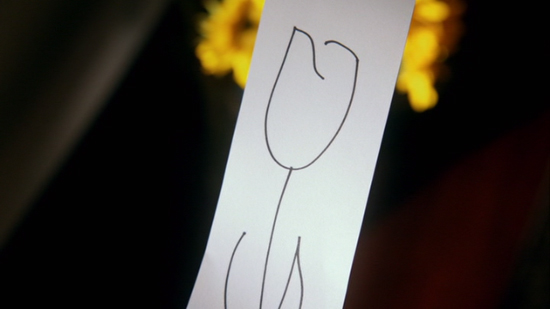
Yeah, I'm going to miss Fringe. Quite a bit, in case my previous reviews aren't a strong indication. The final season isn't the series' strongest outing, but the characters and the premise remain compellingly intact across thirteen episodes set against a bleak glimpse at an Observer-dominated future. The critic in me can't help but acknowledge flaws in the superweapon-driven, tape-hunting plot and the divergence from some of the series' strengths, but it's hard to be upset when the performances, the production design, the suspense, and the writers' obvious adoration for the fans pour through. Considering the fact that Fringe has been ... well, on the fringe of being chopped for several seasons, it's incredibly satisfying to observe a planned, concrete conclusion to a story that remained one of the best unseen shows on TV, especially when it ends on a fast-paced, self-aware note like this that underscores its central themes and mystique. Strongly Recommended, but long-running fans of the show know what to do.
Thomas Spurlin, Staff Reviewer -- DVDTalk Reviews | Personal Blog/Site

Being a fan of Fringe hasn't been an easy affair over the past few years: drops in ratings, time-slot shifts, budgetary concerns, and threats of cancellation as it sat on Fox's notorious chopping block loomed like a storm cloud over the highly-serialized sci-fi show. As the climate got rougher, however, those loyal to the Fringe Division -- or Fringe Divisions, plural, as the series moved along -- proved to be a formidable-enough collective to sustain it across four robust, inventive, and exhilarating seasons. For the series to have the opportunity to craft a thirteen-episode run of fan-service as a farewell,
 a pre-defined and planned conclusion to the overarching story, is actually something to celebrate. There's no denying that the final chapter sees its share of ups and downs, from convenient plans for superweapons to overly devil-may-care usage of pseudo-science to bolster the plot, but it does offer a cathartic and intense conclusion with emphasis on the show's crucial strength: the bond between its characters.
a pre-defined and planned conclusion to the overarching story, is actually something to celebrate. There's no denying that the final chapter sees its share of ups and downs, from convenient plans for superweapons to overly devil-may-care usage of pseudo-science to bolster the plot, but it does offer a cathartic and intense conclusion with emphasis on the show's crucial strength: the bond between its characters. One way to figure out how someone's going to react to Fringe's final run will depend on how they feel about the previous season's (reviewed here) "Episode 19", the annual opportunity the show takes to break from the norm and try something abstract. Last year, that was "Letters of Transit", an episode that took what was assumed to be a glimpse into an unidentified Orwellian future in the year 2036, where the Observers have become fascist overlords and most of the Fringe Division's science/investigation team -- Peter (Joshua Jackson), Astrid (Jaskia Nicole), and Walter (John Noble) -- were carved out of self-inflicted amber and folded into the Resistance against them. The episode itself was successful: bleak, gritty, and sporting a clever (if obvious) twist at the end revealing a Resistance member and Fringe Division agent, Henrietta (Georgina Haig), to actually be the daughter of Peter and Olivia (Anna Torv). On its own, as a standalone "what if" scenario that could be looking into any of a number of realities, it works exceptionally well; however, showrunner J.H. Wyman and his crew adopted this as the basis for the half-season conclusion, in essence canonizing this "what if" situation into the real deal.
Not gonna lie: it's a little difficult to get into the rhythm of this once-speculative, upended dystopian future being where the show has finally arrived. The Fringe crew embark on a search for Olivia's location in a world where certain foods are used as currency and "amber gypsies" are actually a thing, while in the process of seeking out clues to build a vague blueprinted device for defeating the Observers -- which, as the story progresses, Walter conveniently loses the ability to remember. The case-by-case, quasi-scientific procedural structure of the show has been replaced with cutting through amber to find "tapes" that Walter once recorded about his plans in order to jar his memory, leading to obligatory fetch missions, while the dramatic backbone focuses on Peter and
 Olivia as they wrap their brain around this older, somewhat militant blond-haired woman being their once-lost daughter, Etta. Couple that with Walter's struggle with his state of mind, and it's an unusual situation in the dusty, amber-coated lab. Not that that's new or anything.
Olivia as they wrap their brain around this older, somewhat militant blond-haired woman being their once-lost daughter, Etta. Couple that with Walter's struggle with his state of mind, and it's an unusual situation in the dusty, amber-coated lab. Not that that's new or anything. The jury's still out on how I feel about the Observers being the final "villain" that the Fringe team is working against, but at least it's a familiar entity that opens the door for opportunities to deepen the lore and explore lingering questions near the finish line. In essence, J.H. Wyman and his crew have guided the series down a conventional path by creating an overbearing, almost impenetrable threat with the "baldies" -- spearheaded by the particularly sinister Captain Windmark (Michael Kopsa) -- to give our beloved science team a force to combat in place of the shape-shifters. They reach deep into people's minds for answers, to a point where it could cause mental degradation and nosebleeds, and their teleportation ability allows them to pop in and out of locations so easily that they're able to sense danger and, more often than not, avoid being eliminated. The idea of most Observers as hyper-advanced, unshakable tyrants rarely feels creative, even when their morally gray motives are revealed; however, intriguing answers are presented about how September and the more benevolent ones fit into the equation, as well as how they maintain a grasp on "loyalist" humans. It's a trade-off, but not without disappointment.
With only vague remnants of the series' faux-scientific explorations appearing along the way as they discover answers and locate hardware, Fringe becomes all about building this superweapon that the science team simply doesn't understand, either how it works or what it'll do. It's a frustrating twist on the case-by-case procedural formula, a rhythm more similar to the bluntness of recent video-games instead of the series' clever grasp on unraveling mystery. Once you cut through the shift in time and the unbeatable threat they must defeat with the obscure weapon, you'll find some of the same quasi-scientific technobabble and discovery that makes the series an absorbing
 experience. The team investigates a collective of people who record events of humanity's history, who also seem to be experiencing an odd physical abnormality due to their location, while the presence of clairvoyants and pocket universes create obstacles for them to grasp while gathering components. There's something missing, though, and it's hinged on the show's shift from interactive curiosity to this bleak desperation.
experience. The team investigates a collective of people who record events of humanity's history, who also seem to be experiencing an odd physical abnormality due to their location, while the presence of clairvoyants and pocket universes create obstacles for them to grasp while gathering components. There's something missing, though, and it's hinged on the show's shift from interactive curiosity to this bleak desperation. Fringe isn't afraid of exploring this darker side, and that's where its most powerful and unforgettable moments arise during this final stretch. Death occurs that will drive surviving characters towards unexpected methods of combating and standing against the Observers, making emotional envelope-pushing decisions that feel organic with their personality types. Walter ponders which element of himself defines him more: his flourishing intellect or his attachment to Peter, and whether losing one will affect the other. And Peter and Olivia embrace the necessity of what their daughter -- whom we first see as a happy girl blowing dandelions -- has been forced to become as a member of the resistance against those loyal to the Observers, namely her ruthless pragmatism and her inclination towards brutal tactics. The connection between family and friends has always been a, the, cornerstone of this science-fiction series, coupled with consistently outstanding performances; but instead of merely appreciating it this time around, it forces those watching to hold onto that for dear life as the future darkens and options grow fewer.
To counterbalance this, this season goes all-out to reward Fringe's followers with references and revisited plot elements, and in some clever ways that convincingly entwine with the forward-moving story. The writers obviously wanted to make long-running fans feel comfortable in this out-there future by recalling old cases, creating the illusion of widespread connections across the entire universe; one case from the very first season becomes exceedingly important. It's as if they were also marking off a checklist of things that would ensure grins from their fans, too: a return to the "red" universe, Olivia's uniqueness as a Cortexiphan patient, Walter in the isolation
 tank, and others. Fans will even get a charge out of seeing the mysterious glyphs, those emblems they've tracked and independently deciphered from the show's beginning, make an innocuous appearance during one episode. A lot of adoration went into crafting this engaging send-off, at times ignoring practicality simply to nod at those who get why certain things are cool. That even includes a ... uh, trippy "Episode 19" inspired by Monty Python and Moulin Rouge.
tank, and others. Fans will even get a charge out of seeing the mysterious glyphs, those emblems they've tracked and independently deciphered from the show's beginning, make an innocuous appearance during one episode. A lot of adoration went into crafting this engaging send-off, at times ignoring practicality simply to nod at those who get why certain things are cool. That even includes a ... uh, trippy "Episode 19" inspired by Monty Python and Moulin Rouge. This servicing of the fans won't hide the fact that Fringe's final season suffers ups and downs, namely an erratic jumble of monumental, plot-solving devices that lean on the show's fondness for closing the book on complications with jargon and happenstance. Ultimately, though, once the climax comes around, those problem matters far less than how it nails the varied, bittersweet degrees of catharsis and redemption so desperately needed at the close of this story. It also doesn't shy away from answering certain hanging questions -- who the Observers are, what happened to September, how Walter can finally find peace within himself -- with involved connections to the narrative that round off the Fringe experience on a poignant and universe-enriching note, despite how one might feel about the answers themselves. "Brave New World" felt like it could've been a messy grand finale, if needed, but the one-two combo of "Liberty" and "An Ending of Fate" are really made of the stuff that banded the series' fans into a passionate crowd: an emotionally gratifying, interpretive, and reverent fringe event.
Season One Blu-ray (DVD) | Season Two Blu-ray (DVD) | Season Three Blu-ray | Season Four Blu-ray
The DVD:
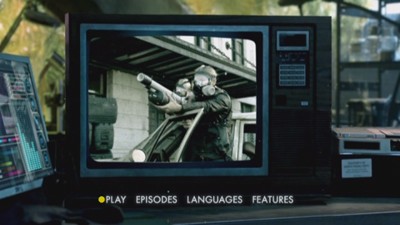 | 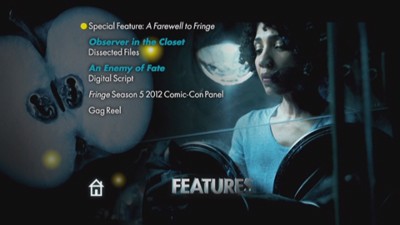 |
Fringe: The Complete Fifth and Final Season arrives from Warner Brothers in a standard four-disc case, with artwork atop each disc that features nondescript observers in different arrangements. Inside, an Episode Guide offers a brief synopsis of each episode alongside the air date and director for each, as well as annotating where the (few) special features can be found. A glossy cardboard slipbox replicates the front and back artwork.
Video and Audio:
Fringe fans pretty much know what to expect from these digital transfers: deep contrast that's often too deep, sharp details, and often vibrant colors. Warner Bros.' arrangement of 1.78:1-framed widescreen-enhanced episodes preserve the consistent look of the series, where most discs have three episodes of material (one has four). In general, the palette for this season leans towards darker, emptier elements out in the dystopian cities, where cold blues often dominate the image -- and are respectfully kept intact, while allowing bits of striking red to show up. Things get a little more colorful inside the lab and in other interiors, where the radiance and depth of amber and sketches on glass boards provide some vivid splashes of color. Tight close-ups are well-detailed, black levels hold their own as they occasionally swallow details, and skin tones carry the right punch.
Audio comes in 5-channel Dolby Digital tracks. Over the years, the Blu-ray treatments have finally moved over to Master Audio sound, but for several years the standard 5.1 offerings nailed the surround presence and aggressiveness of the series suitably enough. The same can be said for this arrangement of tracks: the dramatic score, the firing of quasi-futuristic firearms, and the strange sounds of technology frequently test the sound design to great effects. Dialogue is, surprisingly, a bit clearer than even some of the earlier Blu-rays, though still lacking in the high-end department. There aren't too many instances of aggressive bass to really pick out, save for gunshots and a few thuds, but the sounds of lasers cutting through amber and the frequency of signals tests the upper threshold well. In all, they're plenty satisfying. Portuguese language tracks are also available, as well as a slew of subtitle options: English, French, Chinese, Spanish, Portuguese, and Thai.
Special Features:
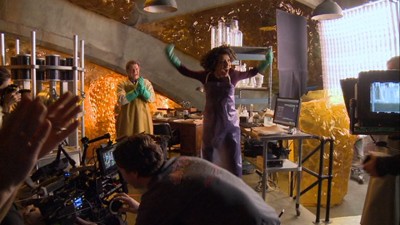 | 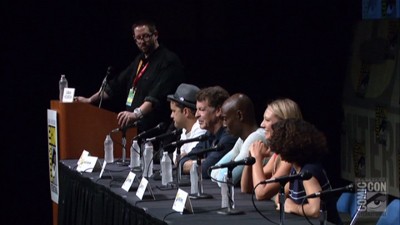 |
A Farewell to Fringe (21:04, 16x9):
Retrospectives often run the risk of being tiresome or a little to emotional for their own good, but I really like where this one goes. Cast and crew interviews from 2008 are paired with current interviews that reflect on their general experiences across the show, mixed with a few anecdotes. J.J. Abrams chats a bit about his initial inspiration behind what he wanted to do with the out-there science, while John Noble talks a bit about how he reacted to Lance Reddig when he first saw him. Also, J.H. Wyman reveals his perspective on how they landed on what questions to ultimately answer ... and which ones weren't as important. Finally, at the tail end, the retrospective focuses on the principal cast members' last days of shooting. Good stuff.
The rest of the special features, few as they may be, are conservatively sprinkled across all four of the discs. Two brief deleted scenes, entitled Dissected Files (16x9), appear on both the first and fourth discs, while a Digital Script for "An Enemy of Fate" (the finale) also pops up on the last one. A Commentary on Black Blotter with J.H. Wyman and editor Jon Dudkowski discusses getting their Episode 19 into this shorter season and trying to go as "far out" as they possible could with it, turning into a largely conversational track with intermittent revelations about shooting specific scenes. Fox have also tossed the Fringe Season Five Comic Con Panel (28:58, 16x9) on here for the fans' viewing pleasure, where a vibrant Jasika Nicole often commands the stage while the rest of the cast offer individual insights about their time working on the show. The panel goes straight for the throat at the beginning by probing J.H. Wyman about when they devised the ending, which receives an honest response, and goes from there. Finally, and somewhat ceremoniously, we've got the last Gag Reel (2:12, 16x9) to appear on these home-video presentations.
Final Thoughts:

Yeah, I'm going to miss Fringe. Quite a bit, in case my previous reviews aren't a strong indication. The final season isn't the series' strongest outing, but the characters and the premise remain compellingly intact across thirteen episodes set against a bleak glimpse at an Observer-dominated future. The critic in me can't help but acknowledge flaws in the superweapon-driven, tape-hunting plot and the divergence from some of the series' strengths, but it's hard to be upset when the performances, the production design, the suspense, and the writers' obvious adoration for the fans pour through. Considering the fact that Fringe has been ... well, on the fringe of being chopped for several seasons, it's incredibly satisfying to observe a planned, concrete conclusion to a story that remained one of the best unseen shows on TV, especially when it ends on a fast-paced, self-aware note like this that underscores its central themes and mystique. Strongly Recommended, but long-running fans of the show know what to do.
|
| Popular Reviews |
| Sponsored Links |
|
|
| Sponsored Links |
|
|
| Release List | Reviews | Shop | Newsletter | Forum | DVD Giveaways | Blu-Ray | Advertise |
|
Copyright 2024 DVDTalk.com All Rights Reserved. Legal Info, Privacy Policy, Terms of Use,
Manage Preferences,
Your Privacy Choices | |||||||













